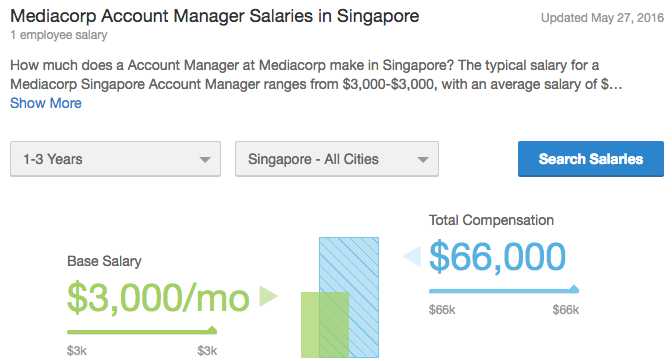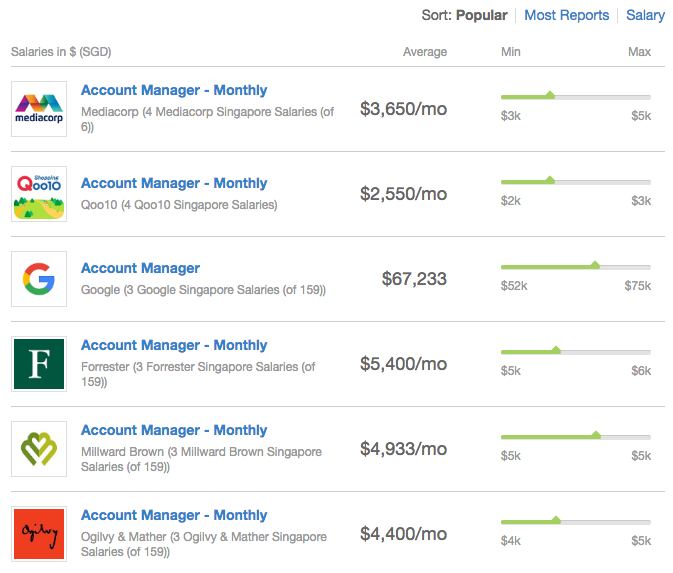 An STJobs article about how 1 in 5 fresh graduates expect a $4,000 starting pay has been making its way around my Facebook feed this week.
An STJobs article about how 1 in 5 fresh graduates expect a $4,000 starting pay has been making its way around my Facebook feed this week.
I could almost hear the sneers coming from my network of friends (i.e. us old bogies in our thirties). Check out some of the comments that I scraped together from my Facebook feed:
- These kids, really think they own the world
- unrealistic singaporeans
- wah lau.. seriously?
I take a slightly different view: I’m all for being ambitious and expecting a higher salary (go millennials go!)… but only if you know what you’re doing. If you’re truly, truly qualified, stop listening to jaded Singaporeans telling you that you shouldn’t be earning more.
So instead of complaining about how dumb these entitled fresh grads are, I decided to write a two-part post on a couple of things they COULD do to 1) Figure out a reasonable but ambitious starting salary, 2) Actually get it.
Let’s start with the first.
The Entitlement Thing
This statement from the STJobs article makes me SO MAD:
Interestingly, 1 in 5 fresh graduates admitted that they had no clue about the usual starting pay of the job they are looking for and thought up a random figure for their expected remuneration.
A random figure? A RANDOM FIGURE?! That’s like saying, “I want to make a gazillion bajillion dollars by age 30!”. The justification that they went to a “recognised local university” is shaky at best.
Think about it: Thousands of people graduate from local universities every year. By 2020, up to 40% of each cohort will enter a local university. Just because you’re one of them doesn’t mean squat:
An earlier MyPaper report… found that one in five employers placed an average premium of $214 per month for local university graduates over those with degrees from overseas.”
$214 is chump change – certainly nothing to shout about. If you really want a higher salary, it has to come from a more solid basis than “I should be paid more cause I graduated from a local uni lol”.
It’s cool to come up with ambitious goals, but they also have to be grounded in reality. So how should these fresh grads figure out how much they should get paid?
By using cold hard data. Here’s how:
Step 1: Identify a Specific Job Title and Company
Ask any fresh grad what they’d like to do as their first job and 90% of the time, you’ll hear lame answers like
- “Oh I really want to work in marketing”
- “I’m really interested in doing something related to my Communications degree”
- “I want a job that makes me a lot of money.”
Answers like these make me want to run naked around the National University of Singapore, beat my head with a frying pan and yell “STOP GIVING GENERIC ANSWERS!!!”
Why? Because everybody else is giving the exact same answers. Worse, answers like these make you seem like you have no idea what you want.
Let’s say that a recruiter calls you up for a standard screening interview and asks, “So, why do you want this job?” Which answer seems more compelling?
- “I want to do something in marketing because I’m PASSIONATE about it” (Ugh, I hate that p-word)
- “I’m looking for a role as an account manager for a digital marketing agency. From the research I’ve done, I know that this role is a mix of consultant, relationship manager and customer support for large advertising clients. My skills are perfect for this role because…”
Having trouble figuring out what you’d like to do? Ramit Sethi from I Will Teach You To Be Rich talks about something known as The Cloud Technique to identify the job title you want.
For example, you can read other people’s job descriptions on LinkedIn, check out job reviews on Glassdoor and Jobiness, and talk to your friends who’re already working in the roles you’re interested in.
At the end of your research, you should be able to identify: 1) the exact job title and 2) the type of company/industry you’d like to work in. For example:
- Business analyst for a staffing and recruiting agency
- Investment analyst for a bulge bracket bank
- Account manager for a digital marketing agency
If you can’t decide on one, at least narrow it down to 2-3 specific job titles. You’ll stand out far more than someone who’s just stuck with a vague idea.
Once you’ve done that, you can:
Step 2: Find The Market Rate For Your Role
Now it’s time to research what other people in similar roles are being paid. This needs to be done before you even start applying to jobs. Why? Because:
- You don’t want to apply to a job where the starting salary is unrealistic. If you’ve got zero work experience (your “internship” as a mascot at USS doesn’t count), asking for a $8K salary is probably way too unrealistic
- You don’t want to be underpaid! Recruiters have a budget too – and if they can get away with lowballing you, they will.
The only way to arm yourself against these scenarios is to actually do the research yourself.
Start off with sites like payscale.com, glassdoor.com, and WDA’s Salary Benchmarking Tool. Since you’ve already narrowed down your exact job title in Step 1, this step is easy-peasy.
For example, here are the average monthly salaries of various Account Manager positions in Singapore from Glassdoor:
Now, just because Forrester pays $5,400 a month, does that mean you should be asking for that?
Of course not! Salaries for the same role can differ widely – A fresh account manager working for Mediacorp is going to be paid very differently from a veteran account manager working for Millward Brown.
But what I love about these sites is that they also allow you to filter your searches by the number of years of experience. For example, here’s the salary for a Mediacorp account manager with 1-3 years of experience:

For each job title, gather the salary profiles of 5-10 companies, and you’ll get a pretty good idea of the “market rate” for your number of years of experience.
Do you see how this is way better than simply coming up with “a random figure”? When you have cold hard data, that immediately helps to clarify which jobs you should be zooming into and salary you should be expecting.
And since 90% of fresh grads won’t do this, it also puts you in a much stronger position when you actually apply for these jobs.
Now, it’s time to:
Step 3: Set Your Ambitious, Realistic Salary Target
Once you actually have the “market rate” for your job title and company – THEN you can start to come up with an expected salary. This could very well be a stretch figure, but it shouldn’t be unrealistic.
If the market rate for your job is $2,000, asking for $4,000 for as your starting salary is just going to make the recruiter laugh in your face. It also reflects very badly on you, since it shows that you don’t really know your industry.
However, if the market rate for your job is around $3,000 – $3,500, then a $4k salary might be justifiable. In general, you wanna gun for something 10-40% above the market rate if you’re a top performer.
Now, how do you position yourself as a top performer in your field to command that salary premium over everyone else?
That’s what we’ll talk about next week. Stay tuned!
Inspiration: How To Choose A Career That You’ll Love by Ramit Sethi
Image credits: RMIT University,

fantastic post, Lionel! Wish this came out a year ago; it would have helped me so much. Especially about looking at specific job titles and responsibilities, etc.
But it’s all great, because I’m currently looking for new employment and this would help loads.
Thanks so much!
Great to know, ST! All the best with the job search!